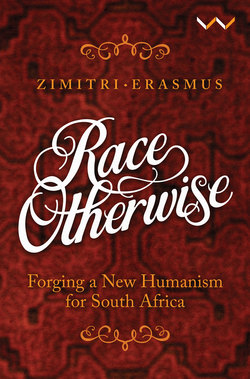Race Otherwise

Реклама. ООО «ЛитРес», ИНН: 7719571260.
Оглавление
Zimitri Erasmus. Race Otherwise
Contents
Appreciations
Abbreviations and acronyms
FOREWORD. Rehumaning our times, or love in a time of hate
Prelude
1. This Blackness
FAMILY STORIES
LIVING INSIDE APARTHEID
A SHIFTING SELF
IN THE CREVICES OF RACIALISED LIFE
LIVING AFTER 1994
Reclassified ‘Caucasian’
Defending the spelling of ‘Coloured’
Unclassified
Lived anti-racialism
THRESHOLDS
2. A Conversation
HOW LIGHT IS BLACK?
RACE AND AFRICA: A FRAME
RESPONSES TO COLONIAL USES OF RACE IN SOUTH AFRICA. Versions of non-racialism
Black Consciousness
THINKING FOR THE FUTURE
3. The Look
RACIALISATION AS METHOD VERSUS RACE AS ONTOLOGICAL REALITY
MAKING RACIALISED BODIES, FAMILIES AND SUBJECTIVITIES
Unspoken anxieties, prohibitions and deceptions
RACE AS ‘FACTISH’
ADVERSARIAL MANOEUVRES
Justice Albie Sachs and the Walker Case
4. The Category
CLASSIFYING PEOPLE
CREOLE: A CLASSIFICATION AND ITS POLITICS
RACE CLASSIFICATION: TWENTIETH- AND TWENTY-FIRST-CENTURY SOUTH AFRICA
CULTIVATING PURITY, POLICING MIXTURE
CREOLISING SUBJECTS VERSUS CLASSIFIED PEOPLE
Illustrations. SELECTED TRADE AND TRAVEL ROUTES IN THE BRITISH AND DUTCH IMPERIAL WORLDS
PORT ELIZABETH DIVIDED INTO RACIALLY DEFINED GROUP AREAS, C. 1943 AND 1975
MY MOTHER’S FAMILY
MY FATHER’S FAMILY
MY PARENTS AND OUR HOME IN KORSTEN, PORT ELIZABETH
5. The Gene
‘MALAY GENETIC ANCESTRY’
‘KHOI-SAN GENETIC ANCESTRY’
‘CHILD RACES’ AND ‘FOUNDERS’
SLIPPAGES IN SCIENCE
GENEALOGICAL KNOWING
SOCIOGENESIS
6. Beginnings
EROS
AIMANCE: LOVE AS POLITICAL PRACTICE
7. Open Closure
Notes. PRELUDE
CHAPTER 1
CHAPTER 2
CHAPTER 3
CHAPTER 4
CHAPTER 5
CHAPTER 6
References
Index
A
B
C
D
E
F
G
H
I
J
K
L
M
N
O
P
Q
R
S
T
U
V
W
X
Y
Z
Отрывок из книги
Race Otherwise
Forging a New Humanism for South Africa
.....
Amsterdam was the place where, for the first time, I saw people considered black and Indische (Indonesian) walk the streets of a city centre, by day and by night, with what struck me as a sense of ownership and belonging. Their postures flipped the posture of deference – albeit a posture held for white people – with which I was familiar. This experience left a lasting impression on me. It was 1982. Donald Woods’s book, because of its liberal outlook and along with many others, was banned in South Africa. It was not on the meagre shelves of Korsten Library. For a while after reading about Steve Biko, I saw myself as Black, in the Black Consciousness sense of the word.
Over time, I knitted together the feelings, glances, gestures, postures and tasks of my world in Korsten and my world at school, Paterson High, in the brown brick-clad township of Schauderville. Woven into these worlds were the worlds of my classmates, the worlds of some of my mother’s family and that of my music teacher, Mr Oersen, who lived in the wealthier suburbs of Gelvan Park and Parkside. Woven into them were the worlds of the people I encountered in Gelvandale, where my mother taught and my father policed, and the world of a house in Kabega Park, in a neighbourhood reserved for wealthy people who were classified White. I was eleven years old when I was ushered into a room in this house. Graced with nothing but a grand piano, it was several times the size of our home on Stanford Road. Paralysed by its opulence, I stood in its acres of lush garden after I had failed my Trinity College piano examination. This was the first time I entered the home of wealthy white people who radiated a whiteness imbued with power and aloofness. With the exception of Aunty Dolly and Colleen, who did not live their whiteness in this way, I knew of white people at a distance, even though whiteness as a construct of superiority seemed close and everywhere. I encountered white people walking in the city centre, shouting orders to road construction workers, and sitting in police vehicles. I knew of poorer people, classified White, who lived in far less grand railway houses. None of this knowledge offered balm for either my shock or my failure.
.....